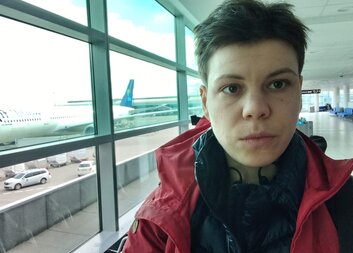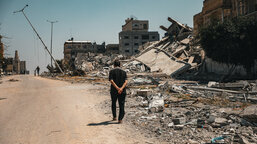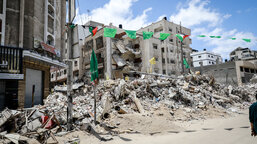The West Bank faces growing challenges. Escalating violence, restricted movement, and complications in the operations of humanitarian organisations are severely affecting local communities. The ongoing conflict in Gaza continues to significantly worsen the situation in the West Bank. We spoke with Kateřina Velíšková, Regional Manager of Caritas Czech Republic for the Middle East, who recently visited the region, about the current situation, the daily lives of local people, and the support provided by Caritas.
DONATE TO HELP CIVILIANS IN GAZA
You recently returned from a trip to Israel and the West Bank. Could you describe the current situation there and how the war in Gaza is affecting the West Bank?
Earlier this year, in June, my colleague and I undertook a work trip to Israel and Palestine, and in November, we returned to the region. In the West Bank, it is clear that the situation has significantly deteriorated since our last visit. We met with several local non-governmental organisations, whose outlook on the situation was very pessimistic. Almost all were focused on preparing contingency plans for various possible scenarios of how the conflict might develop.
One of the most severe issues is the worsening mobility between Palestinian cities in the West Bank. Movement within the region is becoming increasingly difficult. For instance, we spoke with a colleague who lives in Bethlehem but works in Ramallah. A journey that would normally take an hour now takes him three hours each way. The situation in the northern West Bank is even more complicated, prompting local organisations to prepare for potential restrictions on cooperation between different areas.
This was your second trip to Israel and Palestine this year. What was the purpose of this recent visit?
The primary purpose of our work trip to Israel and Palestine was to monitor a project we are working on in partnership with Caritas Jerusalem. The project, funded by the Czech Ministry of Foreign Affairs, focuses on providing primary healthcare and psychosocial support, particularly in Gaza.
During our visit, we met with the team at Caritas Jerusalem and the local project coordinator, Safa Younes. Together, we discussed the progress of the current project and plans for the coming year. We also met with other partners and organisations to outline priorities for the next year. We aim to continue providing primary healthcare and psychosocial support in Gaza, as we see this as an ongoing and highly meaningful necessity.
During your trip, you had the opportunity to witness the situation in the region first-hand. Was there anything that surprised you the most?
For me personally, it is striking to observe the contrast between the ongoing conflict and everyday life. In Tel Aviv, for instance, we sat in a restaurant and felt as though we were in an entirely different world, where the conflict did not exist at all. This is typical of conflicts—daily life simply continues.
Through our work, we were in contact with Palestinian non-governmental organisations, so we were acutely aware of the urgent humanitarian needs in Gaza. This made the reality in Israel, where visible and significant support for the military is evident, even more striking. Such a contrast evokes very mixed feelings.
The conflict undoubtedly has a profound impact on the lives of locals. What was the atmosphere like in the region? Were the signs of conflict visible, or was there more of an underlying tension?
Signs of the conflict are still evident in the region. However, walking through the Old City of Jerusalem, we noticed that more places were open compared to our first visit. While we hardly saw any European tourists, we were surprised to encounter visitors from Asia.
We also visited Ramallah, a vibrant and bustling city with excellent restaurants and shops. Even there, we encountered reminders of the conflict. Although Ramallah is one of the cities least affected by the conflict, we saw burned-out houses targeted by the Israeli military. In Israel, posters and stickers commemorating abducted individuals or fallen soldiers are omnipresent.
Non-governmental organisations face significant restrictions and obstacles. How is Caritas Jerusalem, which has been providing long-term assistance in the region, coping with these challenges?
The operations of non-governmental organisations in the West Bank are heavily restricted. This pressure is also evident in efforts to shut down the United Nations Relief and Works Agency for Palestine Refugees (UNRWA), which runs schools, health centres, and other services in the area. The potential closure of UNRWA would significantly impact the work of other organisations in the region.
As I mentioned earlier, movement between areas is increasingly challenging, especially in the north. Caritas Jerusalem operates in Jenin, but staff from its main office in Jerusalem face significant difficulties in physically reaching the area. Violence in the West Bank is also escalating, with northern areas severely affected by Israeli military actions. All of this greatly complicates our work.
Like Such as in Gaza, Caritas also provides humanitarian assistance in the West Bank. What does this assistance entail?
Caritas Jerusalem offers a wide range of assistance in the West Bank. Near Ramallah, it runs a health centre providing primary healthcare. Many of its programmes integrate development activities with social work. For example, in Bethlehem, it focuses on reducing unemployment among vulnerable groups, such as people with disabilities, seniors, or women who have lost their jobs due to the escalating conflict.
Caritas Jerusalem also supports agriculture and the development of small businesses, particularly in the northern West Bank. Additionally, it provides social support and organises various activities for children and mothers.
It has been a year since the start of the war in Gaza. How is Caritas helping on the ground, and what do people need most?
In Gaza, assistance is primarily focused on emergency humanitarian support. One of the main goals is to provide primary healthcare. Caritas Jerusalem employs approximately 100 people in the region, mainly doctors, pharmacists, and nurses. They are divided into 12 healthcare teams working in health centres operated by Caritas Jerusalem in both northern and central Gaza, including Khan Younis.
In addition to healthcare, Caritas Jerusalem offers psychosocial support and aims to expand its assistance to include activities such as food distribution, financial aid, and the provision of hygiene supplies. However, the emphasis remains on primary healthcare, which is indispensable in the current situation.
You were in the region when the arrest warrant for Benjamin Netanyahu was issued. How did locals react to this news?
Given our role as humanitarian workers, we did not discuss this news with locals. I also did not observe any significant reactions or discussions about it among the people around us.
However, support for the military remains strong in Israeli society. While we were in Tel Aviv, we saw protests, often organised by families of abducted individuals or people connected to them. These groups are exerting significant pressure on the government to resolve the hostage situation, which is a critical issue in Israeli society.
Criticism of Benjamin Netanyahu often centres on this issue—his failure to ensure the return of hostages.
The situation in Gaza is a major topic even in the Czech Republic. What would you like people in the Czech Republic to know about the situation in both the West Bank and Gaza? Is there anything they can do to help?
I deeply regret how little attention the situation in Gaza and the West Bank receives in Czech media and public discourse. Stories of local people rarely emerge, and public discussions often do not reflect the reality. If I could wish for one thing, it would be for people to engage more with the real stories of Palestinians—whether through Caritas or other sources.
Caritas Czech Republic and other organisations are actively working in the region to respond to the immense humanitarian needs, especially in northern Gaza. Addressing these needs will require many years of intensive work. Anyone who wishes to help can contribute to our collection to support civilians in Gaza.
Is there anything else you would like to add regarding Gaza or the West Bank?
I would like to emphasise the importance of not forgetting about the West Bank. In Czech debates and media, Gaza is often the sole focus, which does not reflect the full reality. For instance, when applying for funding for humanitarian aid, it is often designated exclusively for Gaza, as it would be politically unacceptable to label the destination as Palestine.
During our work trip, we witnessed how the situation in the West Bank is getting worse. Local organisations and residents described to us how the conflict in Gaza is severely impacting the area. Access to certain places is increasingly difficult, violence is escalating, and unfortunately, I do not see any realistic chance for improvement—quite the opposite. The situation is likely to worsen further.
Thank you for the interview.
Thank you for helping with us.
DONATE TO HELP CIVILIANS IN GAZA












